Should You Invest in a Whole House Generator?
Thinking about investing in a whole-house generator? It’s a decision that can save you headaches during power outages. Imagine your home remaining cool, your fridge humming, and your lights staying on when the rest of the neighborhood goes dark. It kicks in automatically, thanks to its standby generator feature. So, no more fumbling in the dark or worrying about spoiled food. Plus, it’s not just about convenience. It can boost your home’s resale value. A home generator is a savvy investment if you live in an area with frequent or even infrequent power outages. Unlike a portable generator, a permanently installed house generator offers peace of mind and reliability when you need it most.
Key Takeaways
- Whole-house generator offers seamless power during outages, keeping essentials like heating running.
- Standby units are more reliable than a portable generator, requiring no manual refueling.
- Adds resale value to homes, making it an appealing feature for potential buyers.
- Uses natural gas or propane, offering efficient and cleaner energy options.
- Initial costs are high, but long-term savings and convenience during power outages make it worthwhile.
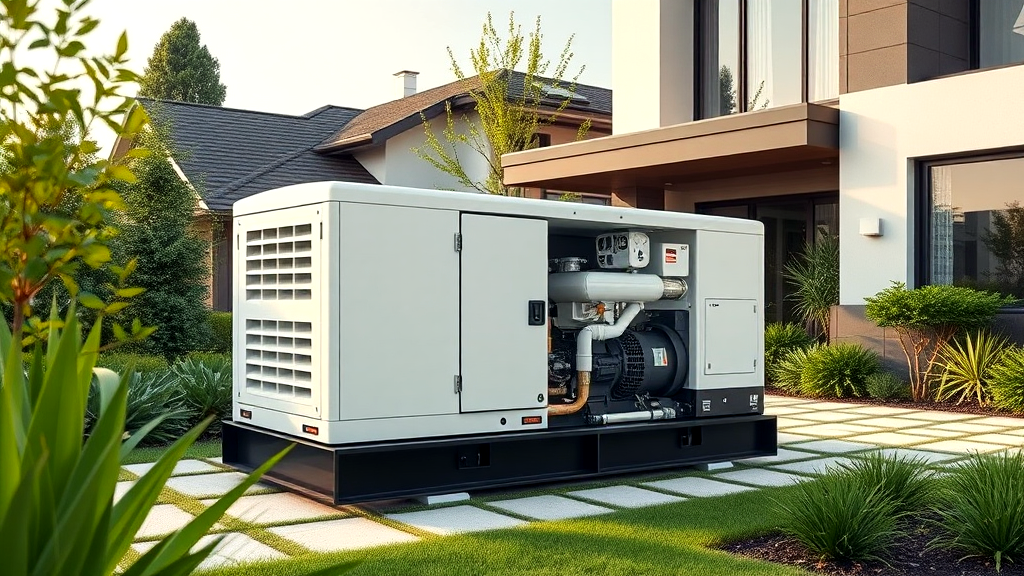
Essential Backup During Power Outages
When dealing with infrequent power outages, opting for a whole-house generator provides unmatched peace of mind. You’ll find it kicks in automatically, ensuring your home remains fully functional. Imagine the comforting hum of your A/C or the gentle whir of the fridge, continuing without a hitch. It’s like having a reliable friend, always ready to step in when needed.
Now, let’s talk about the advantages of a home generator compared to its portable cousin. A standby generator integrates seamlessly with your home’s electrical system. It doesn’t require you to fumble around in the dark or brave the storm to power it up. Fueled by natural gas or propane, it keeps running as long as needed. It’s the backbone of your house’s defense against bad weather.
In contrast, a portable generator might seem appealing due to its lower cost. However, you’ll need to manually start it and manage its limited power capacity. Imagine trying to juggle essential appliances, deciding which ones get to stay on. It’s like trying to fit too many clowns into a tiny car. Not ideal, right?
The whole-house generator advantages extend beyond the technical. Think about the potential bump in resale value. Future buyers will see it as a solid investment, a reassuring sign that the home is well-equipped for emergencies. It’s like adding a cherry on top of a delicious cake, sweetening the deal.
Of course, the financial side isn’t just about resale. Consider the savings from not having to replace spoiled food or repair water damage. With a house backup generator, your refrigerator and sump pump remain operational, protecting both your groceries and your basement. It’s a bit like having an insurance policy that kicks in just when you need it most.
Choosing the right fuel type for your home generator is another piece of the puzzle. Natural gas and propane both offer cleaner energy compared to gasoline. Natural gas flows continuously, while propane is known for its long shelf life. Deciding between them is like choosing between two flavors of ice cream—each has its merits, and it depends on what suits your taste and availability.
The financial commitment of installing a whole-house generator may seem steep at first. Yet, when you weigh the benefits, it becomes clear it’s a sound investment. Think of the relief you’ll feel during the next big storm, knowing your home is prepared. It’s like having a safety net that never lets you fall.
Maintaining your generator is essential for its longevity. Regular oil changes, filter checks, and system diagnostics keep it running smoothly. Consider a service contract for peace of mind. It’s like getting regular check-ups to ensure everything’s in tip-top shape.
So, is a home generator the right choice for you? Weighing the pros and cons, especially in areas prone to outages, helps make an informed decision. Remember, it’s not just about keeping the lights on—it’s about preserving comfort, safety, and convenience, turning a potential crisis into just another day. A whole-house generator ensures that even when the world outside goes dark, your home remains a beacon of light and warmth.
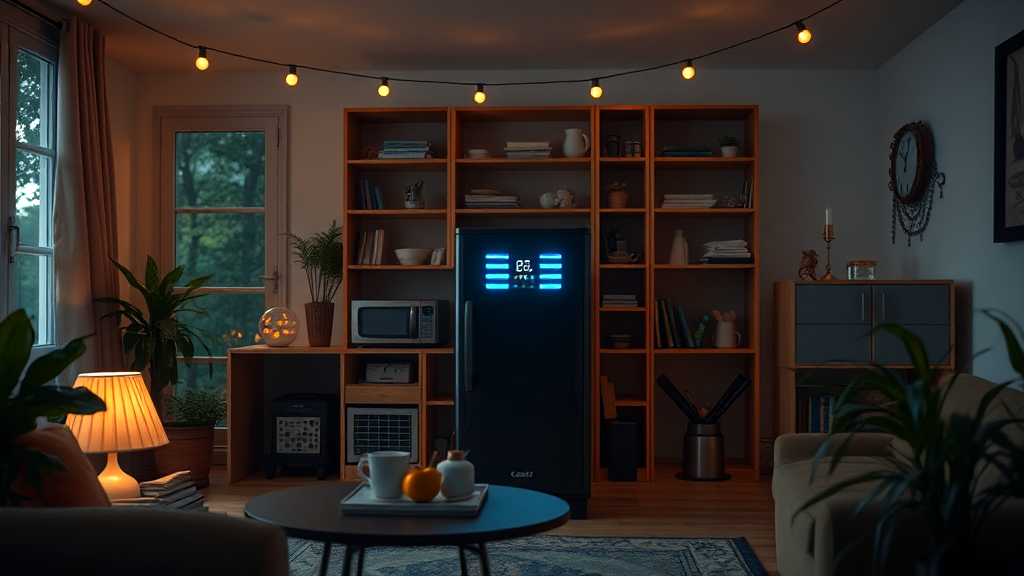
Comparing Standby and Portable Generators
When examining the differences between standby and portable generators, the advantages of a whole house generator become clear. A standby generator offers unparalleled convenience and power, kicking in automatically during power outages. It’s like having an invisible superhero that springs into action when the lights go out. On the other hand, a portable generator requires manual setup and fuel handling, making it more of a hands-on solution during emergencies.
Homeowners living in areas prone to frequent blackouts often find that a whole house generator provides an impressive edge. With its seamless operation and ability to power the entire house, it ensures that your family stays comfortable and safe without lifting a finger. A portable generator, though, tends to be more of a temporary fix, suitable for those who need to keep just the essentials running.
Cost-wise, standby generators come with a higher price tag due to their installation and setup needs. However, they pay off in the long run through added property value and peace of mind. Portable generators, while cheaper upfront, don’t provide the same level of assurance or convenience. They’re like the difference between a full-service restaurant and cooking a quick meal at home.
Consider the fuel efficiency and power output of these options. Standby generators, typically connected to a natural gas line, offer continuous fuel supply without the hassle of refueling. This eliminates the annoying trips to the gas station in adverse weather. Portable generators, in comparison, rely on gasoline, which requires careful storage and monitoring. It’s like comparing a hybrid car to a traditional gas-guzzler in terms of long-term savings and environmental impact.
Maintenance is another area where differences shine. Standby generators need regular professional check-ups to ensure they’re ready when needed. This might seem like a chore, but it’s no more demanding than regular car maintenance. Portable generators, with their simpler mechanics, require more DIY attention. Think of it as the difference between tuning a grand piano and restringing a guitar.
The installation process for a standby generator involves more than just plugging it in. It’s a bit like setting up a home theater system with surround sound—you want it done right for the best experience. Professional installation ensures compliance with local codes and safe operation, whereas a portable generator is more like a simple stereo setup—easy to move and adjust but lacking the immersive experience.
In terms of space, standby generators become a permanent fixture on your property, usually tucked away but always ready. Portable generators, however, are moved as needed, akin to having a camping stove that you bring out for special occasions. This portability can be a double-edged sword, offering flexibility but requiring storage and transport considerations.
Ultimately, choosing between these options depends on your lifestyle and needs. If you crave the security of knowing your home is always powered, a whole house generator is the way to go. It’s the peace of mind that comes with knowing your “house backup generator” is on duty 24/7, like having an insurance policy against unexpected outages. Portable generators, meanwhile, fit the bill for those who need a temporary solution, offering a lifeline when you need it most but without the commitment of a permanent setup.
To wrap it up, both types of generators have their perks, but for those looking for comprehensive power and convenience, a standby system is hard to beat. It’s like having a trusty sidekick always ready to leap into action.
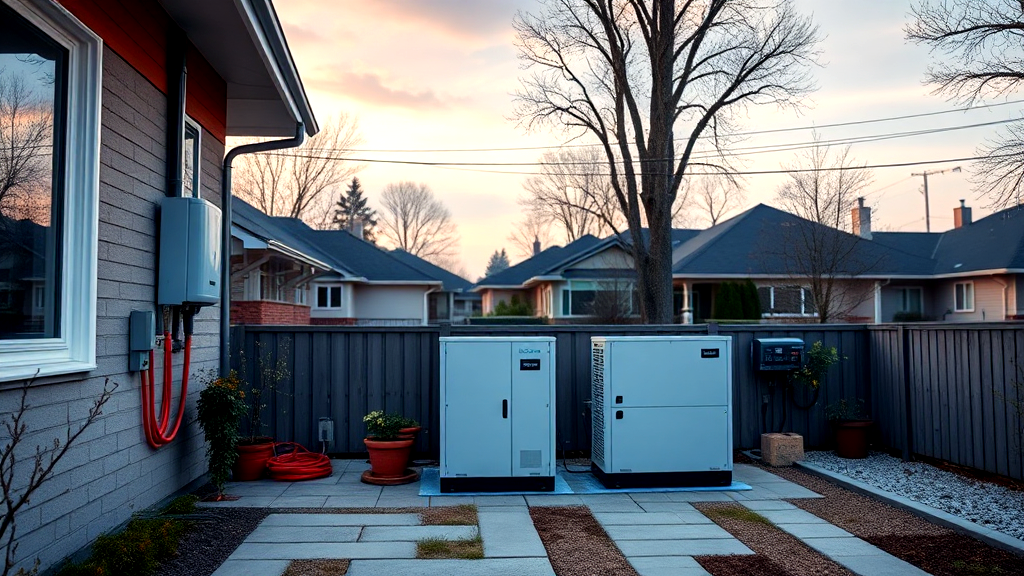
Financial Advantages: Resale Value Boost
The financial upside of adding a whole house generator is significant. Homebuyers often view these generators as a valuable asset, which can lead to increased resale value. It’s like adding a cherry on top of your home’s features, making it more appealing in a competitive market. Think of it as a silent salesperson, always pitching your home’s readiness for any power outage.
A whole house generator ensures your home remains functional during outages. Potential buyers find this appealing, especially in areas where blackouts are common. This advantage can translate to a higher asking price, as buyers are willing to pay more for peace of mind. It’s a savvy investment that offers both immediate and future returns.
Moreover, the convenience factor cannot be overstated. Imagine a buyer touring homes and finding one with a whole house generator. They’ll likely see it as a home that’s ready for anything, a place where they won’t have to worry about the freezer defrosting or the heater shutting off during a storm.
Having a home generator isn’t just about resale value. It provides ongoing benefits to current homeowners, like keeping the lights on and the fridge cold. This capability is invaluable during power outages, ensuring life carries on smoothly without disruption.
Beyond the practical advantages, a whole house generator can reduce stress and provide a sense of security. Knowing your home is prepared for emergencies can be a significant relief. For many, this peace of mind is priceless, further boosting the home’s emotional and financial value.
A backup generator is more than just a piece of machinery. It’s an investment in your home’s future. The benefits, both tangible and intangible, make it a wise choice for anyone looking to enhance their property’s appeal and functionality.
| Feature | Benefit | Impact on Resale Value | Homeowner Advantage |
|---|---|---|---|
| Whole House Generator | Increased Home Functionality | Higher Asking Price | Ensures Power During Outages |
| Backup Generator | Emergency Preparation | Attracts Potential Buyers | Provides Peace of Mind |
| Natural Gas or Propane Fuel | Efficient and Reliable | Environmentally Friendly Appeal | Continuous Power Supply |
| Professional Installation | Compliance and Safety | Boosts Buyer Confidence | Long-term Reliability |
| Regular Maintenance | Longevity | Maintains Home Value | Avoids Disruptions |
A well-installed home generator can significantly boost your home’s market value. But the true value lies in the comfort and security it provides. While potential buyers will appreciate this feature, the primary beneficiary is you, the homeowner. Having a home generator means you’re always prepared, come rain, shine, or blackout. It’s like having an insurance policy that kicks in when the lights go out.
In comparison, homes without this feature may find themselves at a disadvantage. It’s a competitive world out there, and every little edge counts. This is especially true in regions prone to power outages.
So, think of a whole house generator as an investment that pays dividends. Not just when you decide to sell, but every time you avoid a blackout. It’s a decision that’s both smart and practical, offering benefits that go well beyond dollars and cents.
A whole house generator is more than just a purchase; it’s a commitment to protection and peace of mind. Whether you’re thinking about selling or settling in for the long haul, the advantages are clear. With this energy powerhouse at your disposal, your home becomes a beacon of reliability and comfort.
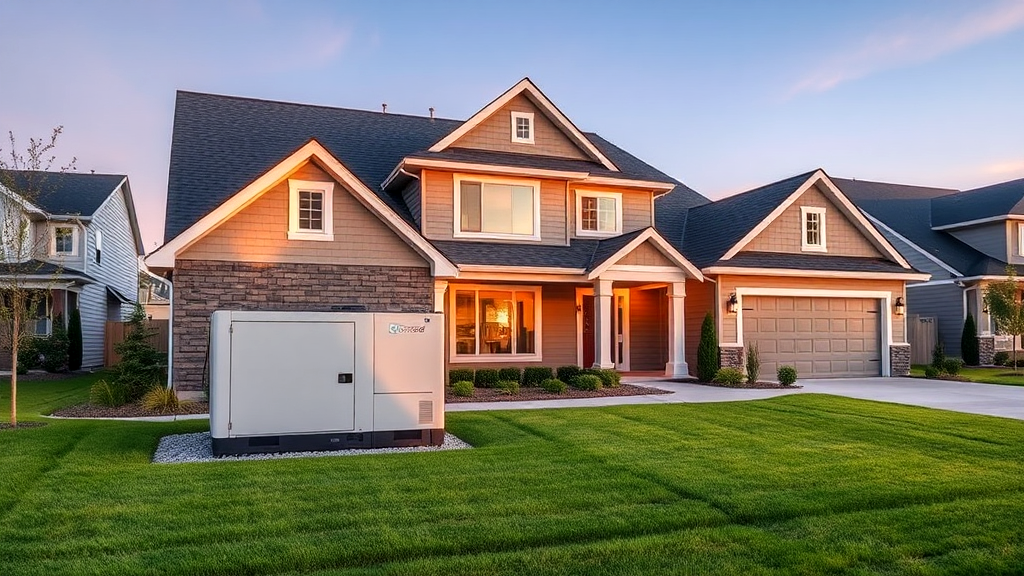
Top 3 Reasons to Install a Generator
What makes installing a generator a savvy move? First up, a whole-house generator provides unmatched peace of mind during those unpredictable power outages. Imagine a storm hits, and the lights flicker out. No stress, your generator kicks in automatically, keeping your fridge humming and the heat on. This isn’t just a convenience—it’s a lifesaver, especially in areas where storms like to make surprise visits. Home generator perks don’t stop at keeping your lights on.
Think about financial benefits. A backup generator can boost your home’s value. Buyers love knowing they won’t have to scramble for flashlights in the dark. This investment often pays for itself when it’s time to sell. Who wouldn’t want a home that’s ready for the unexpected? A generator isn’t just a piece of equipment; it’s a selling point. Homes equipped with this feature often stand out in the market, catching the eye of prospective buyers looking for security and reliability.
Let’s chat about daily life. Have you considered how a home generator safeguards your essentials? Your food stays fresh, and sump pumps keep basements dry, preventing costly damage. That’s a pretty big deal when a power outage tries to ruin your day. No one enjoys tossing spoiled groceries or dealing with a flooded basement. With a generator, you can dodge these hassles with ease.
Switching to fuel choices, whole-house generator advantages include using cleaner energy sources like natural gas or propane. These fuels not just burn cleaner but also offer a seamless energy supply, unlike gasoline. So, you’re doing your bit for the environment while keeping the lights on. It’s a little like having your cake and eating it too, isn’t it? Plus, with natural gas, there’s no need to worry about running out of fuel in the middle of an outage.
Let’s not forget the ease of operation. Once installed, you’re looking at an effortless experience. Professional installation gets your generator up and running without a hitch, adhering to all safety codes. Maintenance is straightforward—think regular oil changes and filter checks. A service contract can handle these, ensuring your system is always in tip-top shape.
Cost-wise, sure, there’s an upfront investment, usually ranging from $5,000 to $15,000. But consider this: the long-term savings and convenience are priceless. Think about the money saved on potential repairs or replacing spoiled food. And let’s face it, not having to fumble with candles or flashlights is pretty sweet too.
Of course, whole house generator advantages aren’t just about what happens during a power outage. It’s about security, comfort, and a little extra peace of mind. It’s knowing that life can continue without a hiccup, regardless of what the weather decides to throw your way. So ask yourself, is it just about keeping the lights on, or is it about ensuring your home remains a safe haven no matter what? Whether you’re gearing up to sell or planning to stay, a generator is more than just a backup; it’s a smart move for today and tomorrow.
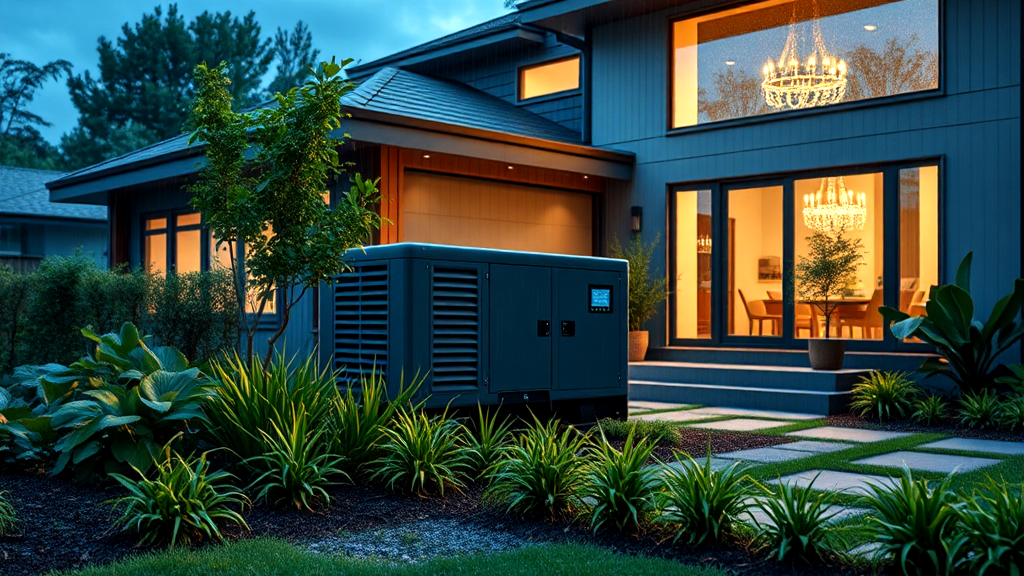
Fuel Types and Efficiency Considerations
Considering the types of fuel available for home generators, each option presents distinct benefits and considerations. Natural gas and propane are the primary fuels for these systems, with each offering unique advantages. Natural gas is lauded for its continuous supply, making it a reliable choice during prolonged periods without electricity. On the other hand, propane boasts a long shelf life, ensuring it remains viable for use over extended durations.
Efficiency plays a crucial role when deciding between these fuels. Natural gas tends to be more cost-effective in regions where it is readily accessible, often providing a lower operating cost. Propane, however, is favored in areas without a natural gas supply, offering a cleaner burn than gasoline. It’s also a boon for those who value eco-friendly solutions, as propane burns cleaner, reducing your carbon footprint.
One might ponder the practicality of these fuel choices. Natural gas homes enjoy the perk of not needing to store fuel, reducing the hassle associated with refueling. Propane users, however, appreciate the certainty of having a dedicated fuel supply on-hand, unaffected by pipeline disruptions. With either option, the whole-house generator advantages are clear: they ensure a seamless power transition, keeping essentials like refrigerators and HVAC systems operational.
Balancing efficiency and cost involves a bit of a juggling act. For some, the initial outlay for a natural gas setup may be higher, but the long-term savings from lower fuel costs can be appealing. Propane setups may involve more frequent delivery coordination, yet they offer a robust alternative for those in rural locations.
Evaluating the right fit for your home involves more than just fuel type. It’s also about understanding your energy needs and how each option aligns with them. Are you in an urban area with a stable gas supply, or do you reside in a rural setting where propane shines? These considerations will guide you to the most effective solution for your household.
When weighing these choices, it’s akin to choosing between a reliable old friend and a new, eco-conscious buddy. Both offer significant reliability and efficiency, but your personal circumstances will dictate the best path forward. For further guidance, MyFinance offers insights into making informed decisions about fuel and efficiency, which could be invaluable during your selection process.
While navigating these choices, remember that the right decision will not just keep your lights on during outages but also ensure your home runs smoothly. Ultimately, these whole house generator advantages translate into peace of mind and uninterrupted comfort, no matter what Mother Nature throws your way.
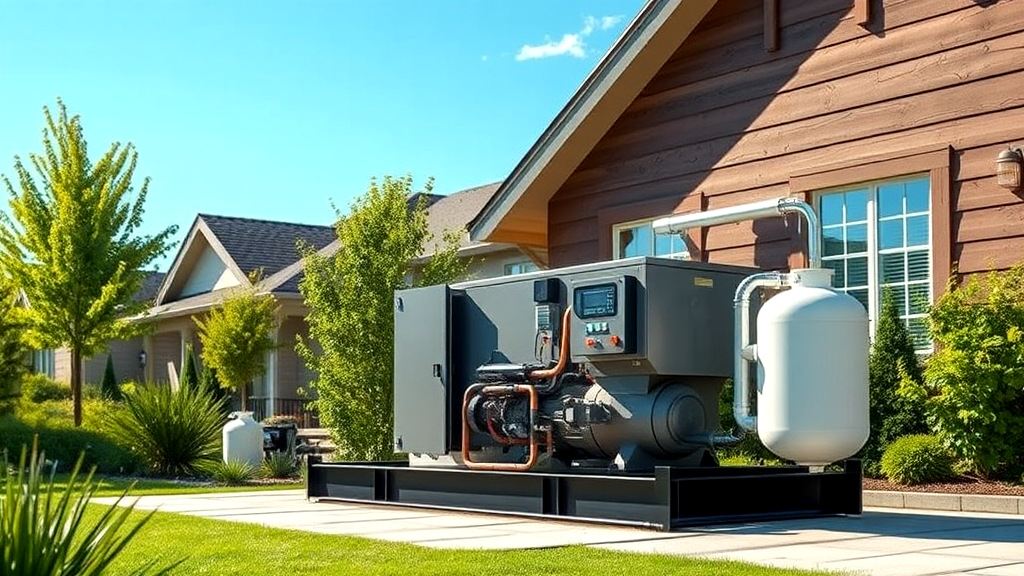
Understanding Installation and Maintenance Needs
Grasping the needs of installation and upkeep is key to maximizing whole house generator advantages. Professional installation ensures compliance with local codes, preventing any potential hiccups. Your generator requires a permanent connection to your home’s electrical system, demanding a skilled hand. This setup not just keeps you within the bounds of safety but guarantees your generator activates automatically when the lights go out.
Maintenance is another ballgame, where consistency is the name of the game. Regular oil changes, thorough filter inspections, and system diagnostics are essential. Think of it like giving your car a routine tune-up. Neglect can lead to performance issues, but a well-oiled machine promises longevity, sometimes stretching up to 40 years.
So, here’s the rub: securing quality installation and maintenance might cost you upfront, yet the payoff is significant. With a home generator, your abode transforms into a fortress against unpredictable outages. Now, some might see maintenance as a chore. But when it comes to protecting your haven and ensuring seamless power during storms, it becomes less of a task and more of a shield.
It’s easy to forget maintenance amidst the hustle and bustle of daily life. However, neglecting these duties can lead to costly repairs or even failure when you need power the most. To find a balance, some opt for service contracts. These offer peace of mind, ensuring regular check-ups without lifting a finger.
In terms of installation, proximity to a natural gas line or a supply of propane simplifies the process. This is where the expertise of professionals comes into play, navigating the intricate dance of local regulations and available resources. Connecting your generator to a gas line might sound complicated. Yet, professionals handle these complexities with ease, ensuring everything goes off without a hitch.
Notably, a generator’s lifespan hinges on the quality of its upkeep. Regular maintenance is akin to feeding a loyal pet—essential and rewarding. For those in regions with constant power interruptions, these advantages are nothing short of a lifeline. They keep your heating, cooling, and essential systems ticking over smoothly, all while your neighbors scramble in the dark.
Interestingly, a well-maintained generator also offers financial benefits. Houses equipped with these systems tend to have a higher market value. Potential buyers often see this as an attractive feature, knowing they won’t be caught off guard by unexpected outages.
People often underestimate the impact of a sudden blackout. But picture this: your sump pump sits idle during a storm, risking a flooded basement. ReliableAir highlights how a home generator can keep critical appliances like these operational, saving you from a potential disaster.
In conclusion, investing in a quality installation and maintenance schedule ensures your generator stands the test of time. It’s not just about having backup power; it’s about having power you can rely on. Ponder your options, weigh the benefits, and make a choice that secures your home’s energy future. In the end, these whole house generator advantages are a game-changer, turning potential chaos into calm.
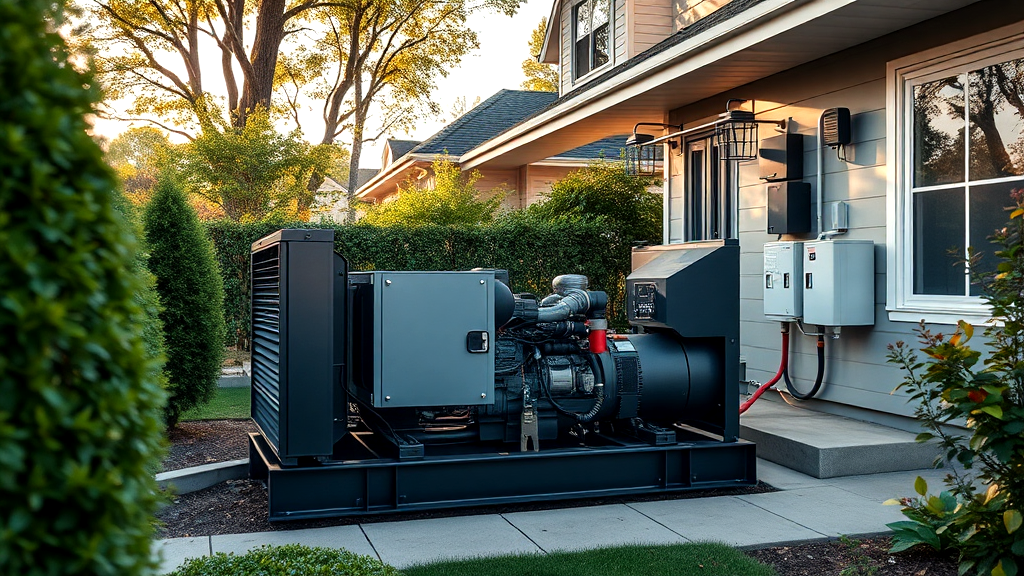
Evaluating Costs vs. Long-Term Savings
Weighing the initial expense against the potential long-term savings is key when considering a whole house generator. At first glance, the upfront cost of $5,000 to $15,000, including installation, might seem steep. However, think of it as an insurance policy that pays dividends over time. Outages can lead to spoiled food, water damage, or even disruptions in critical medical equipment. A reliable home generator sidesteps these issues.
- Preservation of Essentials: During unexpected outages, necessary systems like heating and cooling remain operational, preventing discomfort or worse.
- Food Security: No need to toss out your fridge and freezer contents after a blackout. A working generator keeps perishables fresh.
- Property Protection: Avoid water damage from inoperative sump pumps. This alone can save thousands in potential repairs.
- Increased Property Value: Homes with a reliable home generator often fetch higher prices. Buyers see this as a desirable perk.
- Avoiding Hotel Costs: Instead of fleeing to a hotel during power failures, stay comfortably at home. This saves money and stress.
- Peace of Mind: Knowing that your home is prepared for the unexpected brings immense relief.
- Potential Insurance Discounts: Some insurers offer reduced premiums for homes with backup power solutions.
- Long Lifespan: With proper maintenance, these systems can last 20-40 years, providing enduring value.
Outages aren’t just inconvenient; they can be costly. Preventing disaster with a home generator makes sense for many families. A quick glance at the CDC’s generator safety factsheet highlights safety tips and benefits. They emphasize the importance of professional installation and maintenance, ensuring everything runs smoothly and safely.
Sure, you could opt for something cheaper initially, but consider the broader picture. Is saving a few bucks now worth the hassle and potential costs later? The answer for many is a resounding no. Investing in a comprehensive backup system guards against those unforeseen but inevitable interruptions.
It’s not just about keeping the lights on. It’s about ensuring your home’s heartbeat continues uninterrupted. The true value lies in the comfort and security it provides. In some regions, frequent outages are a part of life. Here, a generator is not just a luxury; it’s a necessity.
Choosing the right generator involves more than just dollars and cents. Think about fuel types, installation requirements, and maintenance needs. Consider your home’s layout and power demands. Each factor plays a pivotal role in determining the best fit for your dwelling.
Ultimately, the decision to invest in a whole house generator hinges on balancing cost against peace of mind. It’s an investment in your home’s resilience and your family’s comfort. As the saying goes, better safe than sorry.
After all, life is unpredictable. Your power supply doesn’t have to be.
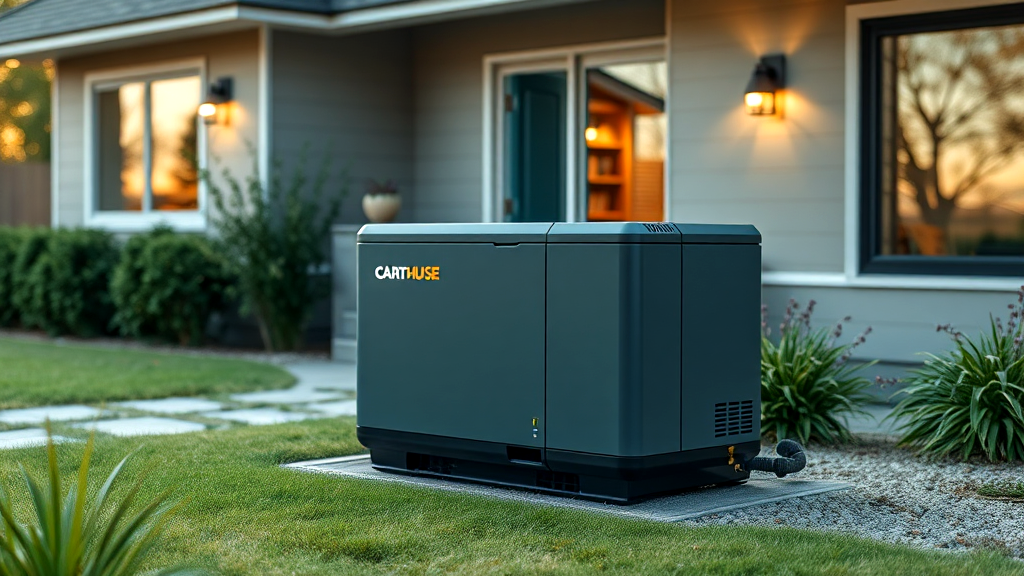
Conclusion
Investing in a whole house generator is like having a safety net for your home. It ensures your lights stay on, your food stays fresh, and your family stays comfortable during power outages. With automatic activation, you won’t be left fumbling in the dark. This investment is especially wise in areas with unpredictable weather.
Choosing between standby and portable generators depends on your needs. Standby generators, while pricier, offer seamless operation and higher reliability. They also boost your home’s resale value. On the other hand, portable generators are budget-friendly but require more effort to operate.
Think about fuel options, installation, and maintenance. While upfront costs can be steep, the peace of mind and protection they offer might just make it worthwhile. Reliability, convenience, and long-term savings paint a compelling picture for savvy homeowners.